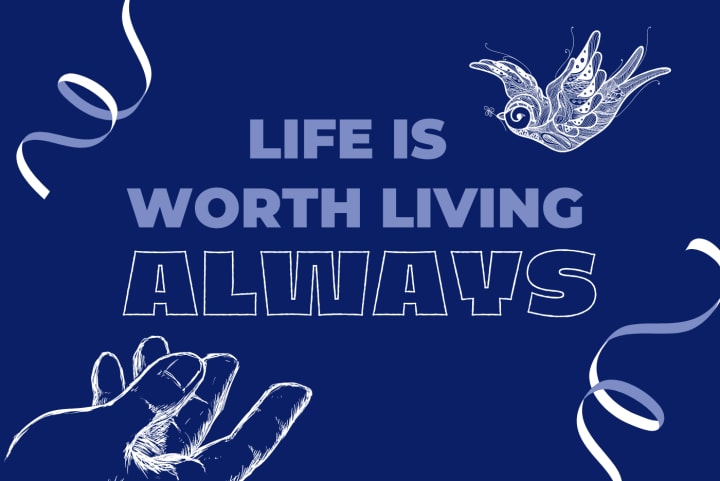The Harsh Experience of Being Committed to a Psychiatric Hospital
The 10-day stay that saved my life.

Trigger Warning: Suicide, self-harm.
Perched on the exam table, I glanced around the white room. People came and went - just ghosts brushing past me. Where I am? I thought. And how did I get here?
Two weeks with no sleep pushed me past the breaking point. I was willing to do anything to stop the voices in my head. The need for peace brought me to this place.
“You’re bipolar,” an unpleasant woman barked at me. She had no interest in learning my name or offering comfort. “You’ll be here at least three days.”
I remember thinking a string of expletives, but nothing came out of my mouth. My unkind doctor was a blur of glasses and blue polyester. Part of me doubted she was real.
A short, black-haired woman checked my temperature and blood pressure. At least, I guessed that’s what she was doing. No one seemed to be interested in telling me what was going on.
Everything was a swirl of muted colors. I could feel the cold exam table where my hands held a tight grip on its edge.
“Why is it so cold?” I asked, but no one answered. I wondered if I’d said the words out loud.
The doctor was too busy to spend more than two minutes with a patient, and she swept out the door without even learning my name. Patient 80263, check.
So, this is the mental hospital, I thought to myself. It was less imposing than I’d imagined.
They put me in the charge of a young male nurse. He was a kind black man, not much older than me, with round glasses and sympathetic eyes. He showed me to my room and then sat sentry in a chair across from my bed.
He was the only kindness I found among the staff during my 10-day stay. Everyone else lived by the tagline, “Take your meds and shut up.”
The nurse gave me a white paper cup with several pills in it. I didn’t look at them or ask questions. I swallowed them all with one gulp of water and prayed they would kill me.
Then, for the first time in weeks, I closed my eyes for longer than five minutes.
One of the insidious traits of bipolar is how it can distort reality. What’s real becomes meaningless because the hallucinations are more vivid than anything else. The things I hallucinated even produced stronger memories than everyday life.
For many months, I’d been tiptoeing on the tightrope of sanity. Most of the time I could smile and laugh, so my friends didn’t realize how bad things were inside. One friend even said, “I know you’re going to be fine because you can still smile.”
Oh, how much you misunderstand the deception of a smile, I thought.
A smile is proof of nothing. It tells little more of its bearer than a theater mask.
Nothing triggered the insomnia. My whole life was full of sleepless nights, but rarely more than two or three in a row.
This time was different. I stopped counting at ten days, but by the time they committed me, it was at least 14 days. By then, nothing mattered. The audio tracks in my head were playing at full volume and top speed. It was the most inhumane torture.

The night they committed me was supposed to be my end. No one was meant to stop me from achieving my goal. The noise was supposed to stop once and for all.
God had other plans, and someone caught on before it was too late. It enraged me, and I became a volcano of vicious contempt. My words were daggers, and I stabbed mercilessly.
What followed was one of the longest days my friends had ever experienced. Feeling helpless, they did the best thing - sought professional help. They took me to a hospital to have me committed. Happy Valley saved my life even if it was full of staff who hated their jobs.
That first night, I stayed in a suicide-watch room. There was wire mesh covering the only window and a camera in the ceiling to watch my every move.
The room was empty other than a thin mattress on the floor in the center of the room. Someone gave me a small blanket, but it wasn’t big enough to cover even half of me. There were no sheets. They didn’t want me to strangle myself with them.
My anger was a boiling caldron inside me. Some quiet voice in a forgotten corner of my mind tried to whisper that this was the best thing, but the angrier, louder voices banished it to oblivion.
I spent the entire night flipping off the ceiling camera and vowing to do whatever I needed so I could get out and finish my task.
Three days turned into ten. For days 2-5, I’m pretty sure I was in a coma. My few glimpses of recollection from those days are only someone waking me up, checking my vitals, and dumping more pills down my throat.
By day six, I resurfaced for moments at a time. I still slept through most of group sessions, but at least I was present and not a lifeless blob in my bed.
By day eight, I felt something I hadn’t experienced in months - a connection to reality. There were pieces of me surfacing, and I was the one listening to other patients, telling them they would be okay.
The real me was still inside, and I was learning to let him breathe again.
Would I do it again?
A lot of this sounds like checking into a psychiatric hospital is a bad thing. I won’t lie. There were many negative things about my visit. However, being placed in a care facility saved my life. Afterwards, I wrote the poem in the video above to remind me to keep fighting.
My friends and family know if they see signs I’m sliding into that dark space again, there shouldn't be any discussion. Their instructions are to do whatever it takes to keep me safe, and ask for forgiveness later.
Being committed was the start of me learning to live successfully with mental illness. It was the tipping point, the pivotal moment where I stood face-to-face with my enemy and received my first useful tools to fight it.
If you are fighting thoughts of suicide, please seek help immediately. Suicide is never the right answer. Things can and will get better, but you have to stay alive to get there.
Until next time, keep fighting.
About the Creator
Scott Ninneman
Bipolar for 49 years, chronically ill for 36. The voice behind the Speaking Bipolar blog. Wrestles taxes by day, wrangles words at night. Thinker. TV Addict. Poet. Links: https://speakingbipolar.com/socialmedia






Comments
There are no comments for this story
Be the first to respond and start the conversation.